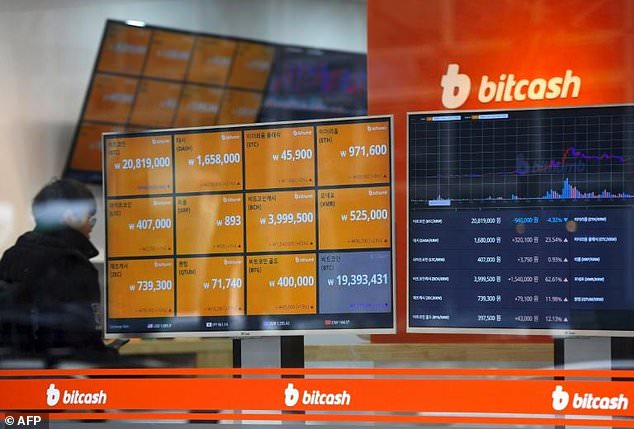
Experts say the North is deploying an army of well-trained hackers with an eye on Bitcoin -- a lucrative new source of hard currency
The messages are alluring, the pictures are attractive. But the women seeking to beguile South Korean Bitcoin executives could actually be hackers from Pyongyang in disguise, experts warn.
In the face of sanctions over its banned nuclear and ballistic missile programmes, the cash-strapped North is deploying an army of well-trained hackers with an eye on a lucrative new source of hard currency, they say.
Its cyberwarfare abilities first came to prominence when it was accused of hacking into Sony Pictures Entertainment to take revenge for "The Interview", a satirical film that mocked its leader, Kim Jong-Un.
But it has rapidly expanded from political to financial targets, such as the central bank of Bangladesh and Bitcoin exchanges around the world, with Washington this week blaming it for the WannaCry ransomware that wreaked havoc earlier this year.
And a South Korean cryptocurrency exchange shut down on Tuesday after losing 17 percent of its assets in a hacking -- its second cyberattack this year, with the North accused of being behind the first.
According to multiple South Korean reports citing Seoul's intelligence agency, North Korean hackers approach workers at digital exchanges by posing as beautiful women on Facebook, striking online conversations and eventually sending files containing malicious code.
They also bombard executives with emails posing as job seekers sending resumes -- with the files containing malware to steal personal and exchange data.
Moon Jong-Hyun, director at Seoul cybersecurity firm EST Security, said the North had stepped up online honeytrap tactics targeting Seoul's government and military officials in recent years.
"They open Facebook accounts and maintain the online friendship for months before backstabbing the targets in the end," Moon told a cybersecurity forum, adding many profess to be studying at a US college or working at a research think tank.
- 'Criminal enterprise' -
Simon Choi, director of Seoul cybersecurity firm Hauri, has accumulated vast troves of data on Pyongyang's hacking activities and has been warning about potential ransomware attacks by the North since 2016.
The United States has reportedly stepped up cyberattacks of its own against Pyongyang.
But Choi told AFP: "The North's hacking operations are upgrading from attacks on 'enemy states' to a shady, lucrative moneymaking machine in the face of more sanctions."
Pyongyang's hackers have showed interest in Bitcoin since at least 2012, he said, with attacks spiking whenever the cryptocurrency surges -- and it has soared around 20-fold this year.
US cybersecurity firm FireEye noted that a lack of regulations and "lax anti-money laundering controls" in many countries make digital currencies an "attractive tactic" for the North.
Cryptocurrencies, it said in a September report, were "becoming a target of interest by a regime that operates in many ways like a criminal enterprise".
It documented three attempts by the North to hack into Seoul cryptocurrency exchanges between May and July as a way to "fund the state or personal coffers of Pyongyang's elite".
In October, Lazarus, a hacking group linked with the North, launched a malicious phishing campaign targeting people in the bitcoin industry with a fake but lucrative job offer, according to US cybersecurity firm Secureworks.
- 'Hard to predict' -
Hacking attacks targeting digital currencies are only the latest in the long list of alleged online financial heists by the North.
The North is blamed for a massive $81 million cyber-heist from the Bangladesh Central Bank (BCB) in 2016, as well as the theft of $60 million from Taiwan's Far Eastern International Bank in October.
Although Pyongyang has angrily denied the accusations -- which it described as a "slander" against the authorities -- analysts say the digital footprints left behind suggest otherwise.
The attack on the BCB was linked to "nation-state actors in the North", cybersecurity firm Symantec said, while the Taiwanese bank theft had some of the "hallmarks" of Lazarus, according to the British defence firm BAE Systems.
Proceeds from such actions are laundered through casinos in the Philippines and Macau or money exchanges in China, said Lim Jong-In, a cyber-security professor at Korea University in Seoul, making it "virtually impossible" to trace.
The global WannaCry ransomware attack in May infected some 300,000 computers in 150 nations, encrypting their files and demanding hundreds of dollars from their owners for the keys to get them back.
Experts say that young hacking talents are handpicked at school to be groomed at elite Kim Chaek University of Technology or Kim Il Sung Military University in Pyongyang, and now number more than 7,000.
They were once believed to be operating mostly at home or neighbouring China, but analysis by cybersecurity firm Recorded Future noted "significant physical and virtual North Korean presences" in countries as far away as Kenya and Mozambique.
FireEye CEO Kevin Mandia put the North among a quartet of countries -- along with Iran, Russia and China -- that accounted for more than 90 percent of cybersecurity breaches the firm dealt with.
Its hackers, he said, were "interesting to respond to and hard to predict".
Hi! I am a robot. I just upvoted you! I found similar content that readers might be interested in:
http://www.digitaljournal.com/news/world/north-korea-s-new-front-cyberheists/article/510446
Downvoting a post can decrease pending rewards and make it less visible. Common reasons:
Submit